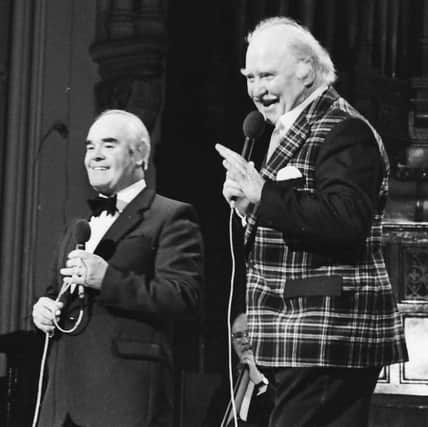Josef Locke: He was a '˜multi-coloured' performer in a world full of grey people


Described as the Tom Jones of his day, Locke was, at the height of his fame in the 1950s, earning an eye-watering £1,000 per week on the British variety circuit.
As Columbia Records’ biggest selling UK artist, Joe, as he was known to family and friends, had his adoring audiences eating out of the palm of his hand.
Advertisement
Hide AdAdvertisement
Hide AdHis interpretation of ballads such as “Hear My Song,” “Count Your Blessings” and “I’ll Take You Home Again, Kathleen”, reduced many of his fans to tears.
Josef Locke’s rollercoaster life story is now chronicled in a new book - ‘Josef Locke: The People’s Tenor’ - by musician and writer Nuala McAllister-Hart who hails the Bogside-born man as “one of the most popular singers of the 20th century.”
Josef Locke was born Joseph McLaughlin in 1917 and was reared in a house in Creggan Street, directly opposite St. Eugene’s Cathedral. The son of a butcher and cattle dealer, he was one of 10 children. He sang at churches in the Bogside as a child and after a rudimentary schooling, joined the Irish Guards, later serving with the Palestine Police before returning to Ireland in the late 1930s.
He then became a policeman and, performing semi-professionally, was known as “the Singing Bobby.” He reportedly sought advice about an operatic career from the greatest Irish tenor of them all, John McCormack, who is said to have told him that his natural showmanship might serve him better on the popular stage.
Advertisement
Hide AdAdvertisement
Hide AdLocke subsequently went to London where impresario and bandleader, Jack Hylton, was so impressed he booked him into the Victoria Palace. It was Hylton who renamed him - Joseph McLaughlin was considered too long for variety bills.
After some success in London, where he made his first recordings in 1947, Locke signed with Lew and Leslie Grade, who realised that his style and penchant for sentimentality might go down better on the northern variety circuit and steered him to stardom.
Apparently squandering his vast earnings, in 1958 Locke fled back to Ireland with the Inland Revenue hot on his heels.
Despite this vanishing act, however, there was no sign of any lessening in his popularity and, indeed, 20 years later, a masked singer, sounding uncannily like Locke and billed as “Mr X”, made some appearances in British clubs and it was thought that Joe had returned incognito. It turned out not to be the case.
Advertisement
Hide AdAdvertisement
Hide AdThis particular chapter of Locke’s life story was told, rather fancifully, in Peter Chelsom’s 1992 film, ‘Hear My Song,’ in which the tenor was played by Ned Beatty.
Nuala McAllister-Hart, in her new book, writes that some parts of the “myth” of Locke - who passed away in 1999 - are completely false, others exaggerated, while others have acquired a “rosy glow” in people’s memories.
She tells the Locke story via contemporary newspaper reports and advertisements, theatre programmes and reviews, weaving them together with the personal reminiscences of those who knew and performed with him over the years.
From his early days in opera, through his heyday on the variety circuit, to his later years as a respected elder tenor, it’s all covered in detaill in ‘The People’s Tenor’.